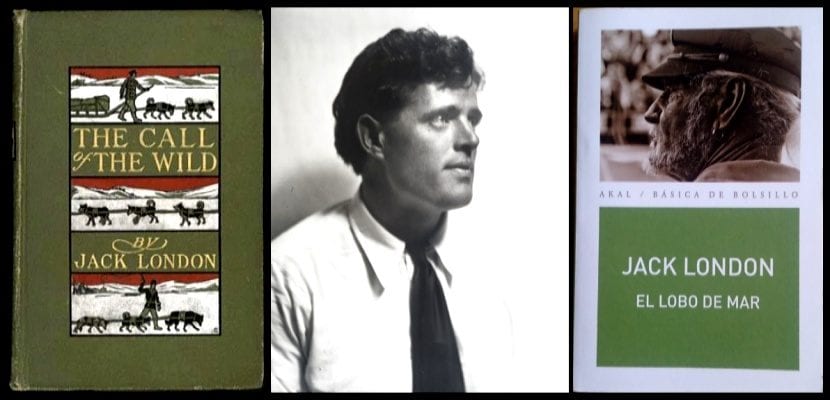
Jack London and a couple of his classics
The centenary of death of one of the famous writers of American literature. Jack London (San Francisco, January 12, 1876 - Glen Ellen, November 22, 1916) lived only 40 years, but he did it with all the intensity. His life was his greatest adventure and thus he knew how to write the ones he created. In a big way. London, a war correspondent, committed socialist and even more committed to the animal world, gave a title to unparalleled and unforgettable journeys and characters.
His greatest tribute in his work is for Nature, and the description of its strength, power and essence is in each of those adventures.. His commitment to her and that vital intensity were what took their toll. His work may be even more alive a hundred years later and can be read by readers of all ages. Buck or White Fang are still two of my best friends.
Es impossible to condense all his work into a few lines or talk about his life full of travel and experiences. Hawaii, Japan, Mexico, Jack the Ripper's London, the Alaska of the gold rush… He stepped on them all. It is also impossible to highlight any of them, nor to choose between so many good characters. I will stay with the most classic, a trio of my favorite animals: dogs and wolves.
The call of the wild (1903)
(…) And when in the still and cold nights he directed his snout towards some star and howled like a wolf, it was his ancestors, dead and already turned into dust, who directed his nose to the stars and howled through the centuries. And Buck's cadences were their cadences, the cadences with which they expressed their grief and the meaning that silence and cold and darkness had for them.
I'm from a small town I grew up in the country and have lived with several dogs throughout my life. My father and my grandparents were hunters and I learned to differentiate between hunting and killing. Reading stories like Buck's at a very young age can also mark you.
Courage, determination, effort, loss, overcoming and, especially, loyalty are concepts that have their maximum expression in the physical and spiritual journey that we take with Buck. We lose our master and a quiet life, and we feel the harshness of a new existence in the most inhospitable and ruthless condition that, however, does not embody Nature, but other human beings.
But you have to survive, move on. So our muscles also grow when pulling heavy sleds over perpetual snow and ice. Then only chance brings us to Thornton and when he saves us we want to regain faith in men. So we follow him, we make him that god to whom we will always be loyal because it is what we carry in our blood. Or not.
Because out there in the deepest and most unknown darkness of the forest, in the farthest part of our blood too there is that call. What really beats us the most. What they have more like us. Because we are more. When they take Thornton from us too that sound screams at us from within. We can't lose anymore. Y we run to ours.
White tusk (1906)
Wolves are the sharks of the earth. They know what they do much better than we do. They follow our lead because they know they will eventually get hold of us. They sure hunt us down.
That quote is from one of the few dialogues that we find in this novel, as famous or more famous than the previous one, and practically symmetrical. This time we are closer to the wolves and we feel wilder. Who can resist stepping into the skin of a dog more wolf than a dog they call the White Fang? Only the name already denotes fierceness and struggle, and we have lived it all through his eyes since he was a puppy.
Now, however, we take the reverse path from indomitable to quasi-docile as we have more human contact.. The mistreatment of Gray Castor and the cruel dog fights in which Handsome Smith puts us where we almost lose our lives. Good thing Wheedon Scott rescued us and stayed with us. With him we learned what love, loyalty and that absolute melancholy and despair are when the person who has taught us the most and we love is absent.
This is possibly the best known of the several adaptations of this novel to the cinema.
Whitehttps: //www.youtube.com/watch? V = EBrV_mgkIuw
The sea wolf - (1904)
Here we are already wolves, we sail in a frigate called Ghost and we are in command of one, of course: Captain Lobo Larsen. This time we hunt seals and also intellectual, refined and highly idealistic castaways like the young Humphrey van Weyden. Larsen is cruel, ruthless and unscrupulous. We are subject to his tyrannical authority and Van Weyden will soon discover the harshness and impiety of the primitive world that Larsen represents. But you will also learn from him.
There are some good film adaptations about this novel. I prefer the classic by Michael Curtiz (1941), with a memorable Edward G. Robinson and a contemporary from 2009.
Why read them
The clash between civilization and nature, the perpetual struggle between good and evil, the survival of the fittest, genetic determinism, natural selection and ... ADVENTURE in its purest expression. And because it's Jack London. Your name is already a unique reason.